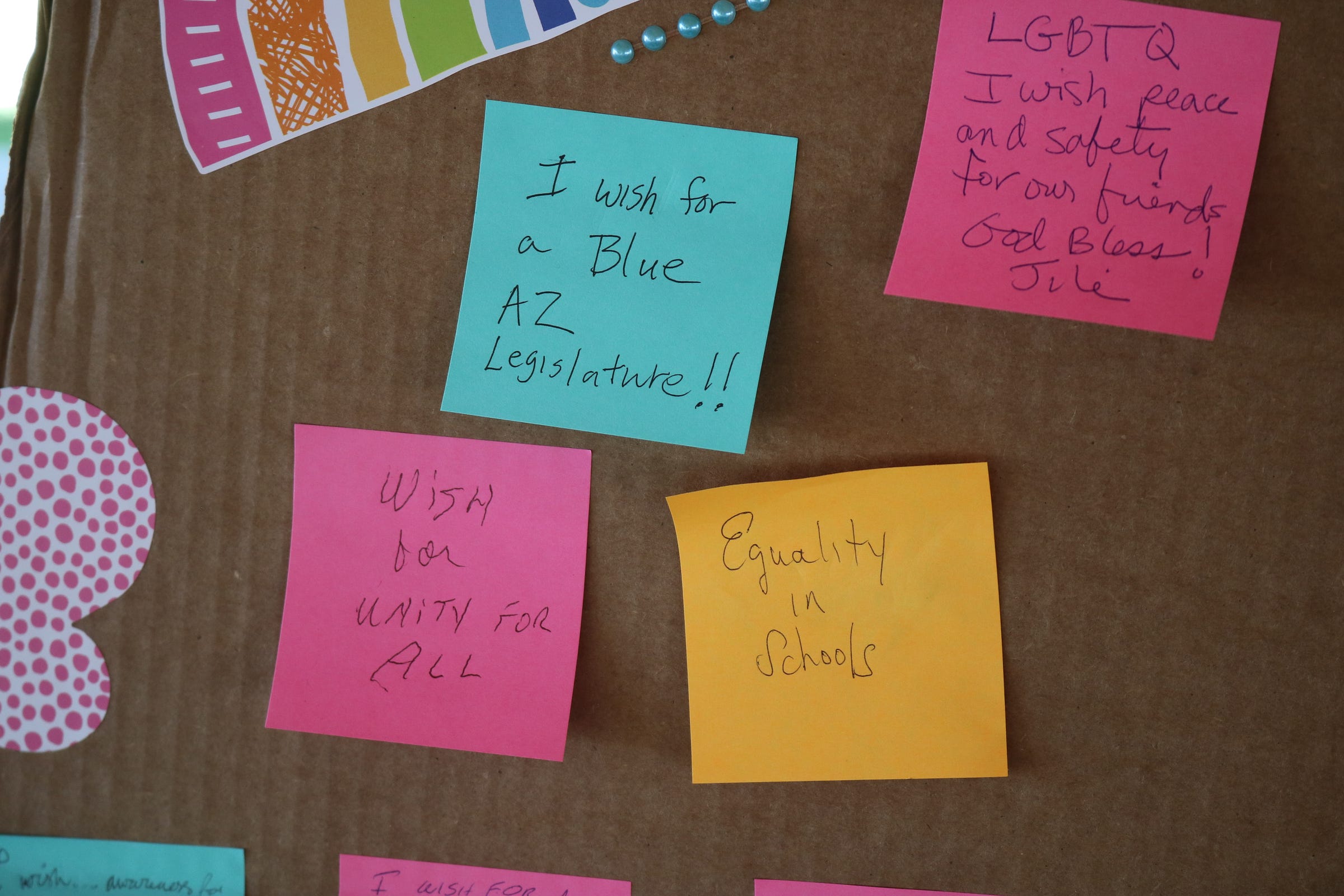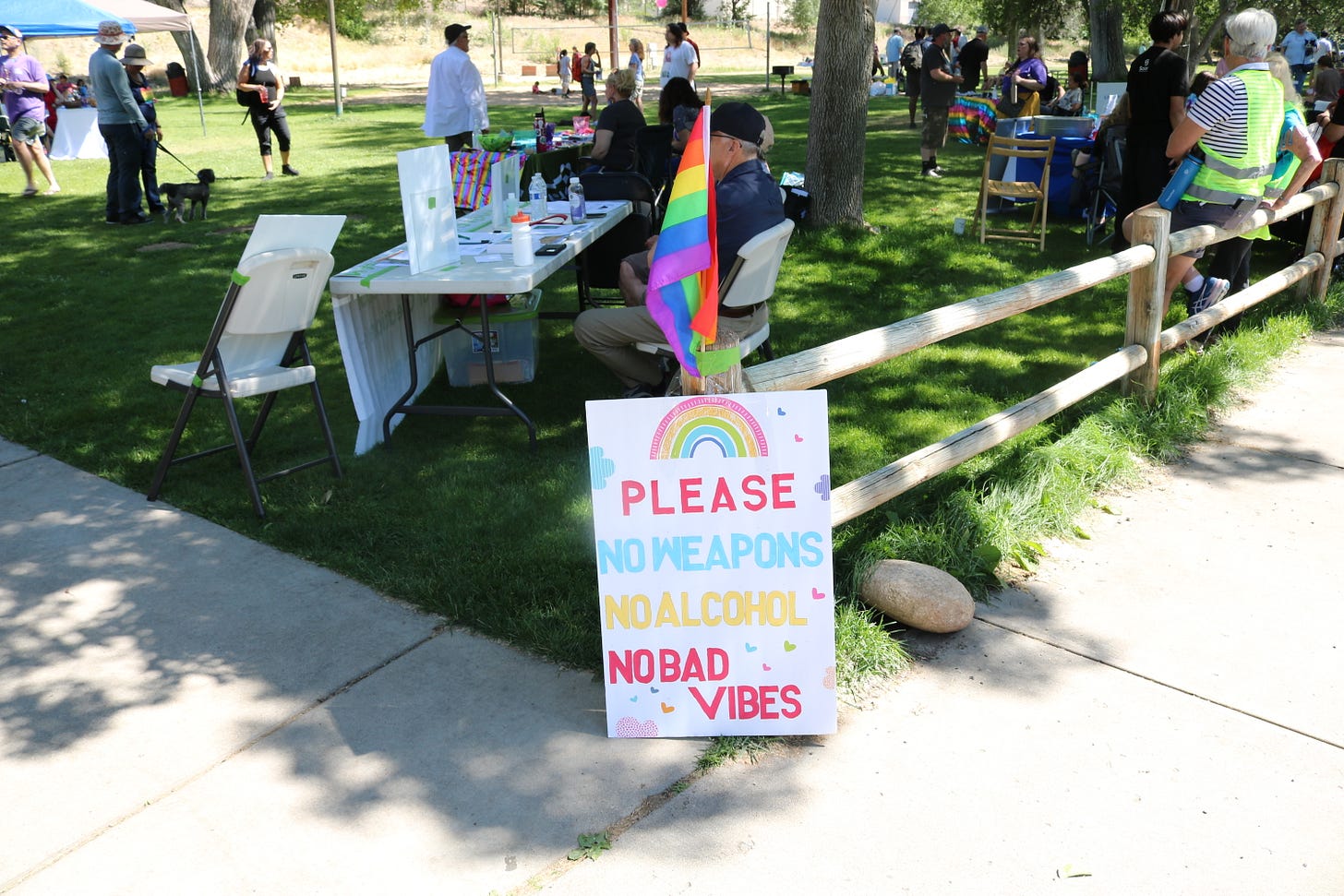In rural Arizona, queer communities brace for impact
Small town pride celebrations are being met with online and physical threats, mostly by far-right legislators and religious groups

This story was published in partnership with the Arizona Mirror, an independent, nonprofit news organization that covers Arizona government and politics and is an affiliate of States Newsroom, a national 501(c)(3) nonprofit supported by grants and a coalition of donors and readers.
On one side of Granite Creek Park earlier this month, members of Prescott’s LGBTQ+ group, Prism Network, had a cake walk. They put up a “wishing wall” to write notes of hope, and had a board of photos with owners and their pets.
Meeting them on the other side were members of a local far-right hate group.
It was an outcome Prescott’s queer community has been forced to live with. Every time they put on an event to make queer people visible in this rural northern Arizona city, they said, they’ve experienced twice as much pushback, and even death threats.
In years before, members of the nonprofit group had planned on protests or foul-mouthed passersby. They even had a sign out front preempting that, asking for people to take their “bad vibes” somewhere else.
But this year has been different, members of the Prescott community said.
The all-volunteer team of community organizers at Prism Network’s Pride Picnic said that anti-LGBTQ+ rhetoric in Yavapai County has escalated. Organizers said they had received numerous homophobic threats leading up to the day of the picnic, and for the first time in their history, Prism hired off-duty police officers to protect people who simply showed up to eat snacks and win cakes.
What’s happening in Prescott is not unique, but instead a small ripple effect from the nation’s politics: A rise in anti-LGBTQ+ sentiment, spurred by discriminatory media coverage and laws, has created a climate of hostility towards the queer community in both suburban and urban areas.
But in the far-flung rural areas, there are few resources to help.
A national trend come home
Between June 2022 and April this year, there have been at least 356 incidents of anti-LGBTQ+ hate and extremism in the U.S., according to a new report from the Anti-Defamation League and the Gay and Lesbian Alliance Against Defamation.
The incidents listed in the report included armed members of Proud Boys and the Patriot Front, both militant and far-right hate groups, protesting and disrupting drag shows, persistent bomb threats (including one in Tempe) made on various queer-focused events and businesses, and violent threats of harm to other LGBTQ+ organizations.
At the start of June, the Human Rights Campaign declared a state of emergency for LGBTQ+ people. The 2023 legislative session has been the worst year on record for anti-LGBTQ+ legislation, with more than 75 anti-LGBTQ+ bills have gone into law this year across the U.S. — doubling last year’s record. A total of 525 bills targeting the queer and trans community have been introduced in 41 states.
Arizona’s queer community has, for the most part, evaded the trajectory of other conservative-majority states. Democrat Gov. Katie Hobbs, who has vetoed seven anti-LGBTQ+ bills that made it to her desk, said that, “Intolerance has no place in Arizona, despite the legislature’s frequent attempts to pass legislation that says otherwise.”
Still, legislators introduced 13 homophobic bills, as classified by the LGBTQ+ rights group Equality AZ, in an attempt to win political points on the nation’s culture wars.
“I’ve seen people online calling librarians groomers, predators, pedophiles that they’re preying on kids, that our library staff are committing felonies, and that they’re supplying sexual content to children…That is not the case.”
-Kell Palguta, Prescott Valley Mayor
The Republican-backed bills included an anti-trans bathroom bill that would ban students from using the restroom that matches their gender identity, a pronoun bill that would have required parents to give signed permission for students to be called by their preferred pronoun, a parental rights bill that would allow parents to sue teachers for providing affirmative LGBTQ+ spaces and a set of drag bans that set out to criminalize and restrict drag shows.
And though the bills were always doomed to fail with Hobbs as governor, the goal to introduce legislation and gin up public anger over LGBTQ+ issues appears to be working, at the very least in Prescott.
Puppies vs. Proud Boys
In past years, Prism has hosted its annual picnic at Watson Lake, a reservoir about four miles north of Prescott. Surrounded by round granite boulders, the picnic used to take place on top of a hill where the wind, locals say, had a mind of its own: Attendees talked about the 2018 “gaynado” – a small microburst that sent papers from vendors and canopy tents flying everywhere, and also snatched the wig off a local drag queen’s head. As the lore goes, the wig still wanders the lake.
To keep the picnic close to downtown Prescott this year, though, the venue changed from Watson Lake to Granite Creek Park.

The move wasn’t just for geographic reasons, organizers said. It also made sense in terms of the community’s safety. As the small, rural queer community faced increased opposition, it made sense to be closer to town in the event of hecklers or, worse, an active shooter.
Molly Freibott, the co-founder of Prism Network, said religious groups earlier in the year started threatening members, with email subject lines that read: “Stop the Satanic worship,” and “God hates Pride.”

Most threats Prism receives are anonymous, but two groups, Prescott Valley Republican Women and Granite Mountain Republican Women, openly led threats and harassment campaigns against community members in the past.
When the Prescott Valley Public Library created a small display for Pride in the children’s section of the library, representatives from the Prescott Valley Republican Women and Granite Mountain Republican Women’s group harassed librarians. Women from the group called for librarians to resign from their positions or requested they be fired, says Freibott.
The librarians were concerned for their job safety and contacted Prism for support. Prism organized a letter-writing campaign and demanded that the Prescott Valley City Council respond. Prescott Valley’s mayor Kell Palguta later said at a city council meeting that no books would be banned.
“I’ve seen people online calling librarians groomers, predators, pedophiles that they’re preying on kids, that our library staff are committing felonies, and that they’re supplying sexual content to children,” Palguta said during the meeting. “That is not the case.”
Prism has faced opposition to its LGBTQ+ community-building work in the past, but recent threats have pushed much of the work Prism and other local LGBTQ+ organizations are doing into the underground.
Prism’s trans-specific support group no longer publicly lists the date or location of its meetings online. Two months ago, a queer prom for teenagers was postponed because of ongoing death threats, and was ultimately relocated to an undisclosed location.
The Launch Pad Teen Center Prescott, which hosts a weekly meetup by the Phoenix’s LGBTQ+ youth group One-n-Ten, said their organization faced intense scrutiny during the recent Prescott School District Board elections because of their connection to One-n-Ten.
One-n-Ten could not confirm any specific anti-LGBTQ+ threats made, but did say in an emailed statement that, "We are aware of the increased anti-LGBTQ+ rhetoric in and around the Prescott satellite and have taken heighten safety precautions to ensure the safety of the young folks who attend this group."
Embry-Riddle Aeronautical University’s Prescott campus announced plans to host a drag show in April and consequently received death threats. News of the event reached international sponsors of the school, who threatened to pull sponsorship if they hosted the event. Word of the drag show spread on social media and far-right conservatives called, emailed, and threatened the school for hosting the event. The drag show was canceled.
Prism leaders believe the Pride Picnic would have been susceptible to additional threats from other conservative groups in the area if the group had publicly promoted the event on social media. Because of the rising anti-LGBTQ+ fervor in town, Prism opted to share the invite mostly through word-of-mouth.
“I had to go around the picnic three times and let everyone know—we hired the police, they’re with us and there’s nothing going on,” said Friedbott. “This wasn’t an event where adults are attending with full knowledge that there could be protestors. This is an event where there’s kids, babies, seniors, and puppies.”
Feeling like a “sitting duck”
Prescott wasn’t the only city facing these kinds of threats from far-right militant groups and the legislators who support them.
In Flagstaff, on the same weekend as the Pride picnic, the annual Pride in the Pines celebration held at the Thorpe Park Ball Fields was also the focus of conservative state Sen. Wendy Rogers, who called on her Twitter and Truth Social followers to protest outside an after-party drag show that was aimed at people over 16 years old.

In her post, she told her followers to call a child protective services hotline to complain that adults were abusing children by letting them attend the drag show.
The event ended up hiring extra security, though only one protester showed up.
Hiring off-duty police officers comes at a financial cost for Prism, which is an all-volunteer run organization. The nonprofit, run under the Greater Yavapai County Coalition, only raised less than $4,000 in its last tax filing year.
John Duncan, an event planner for the Prism Network, organizes drag shows and theatrical productions in Yavapai County. He started, for the first time, receiving hate mail and calls this year and started paying for security.
“It’s all been because of the political environment of what’s happening, and that’s primarily because of the drag shows,” he said.
Duncan said there haven’t been any serious incidents, and that most of the threats end up not being real.
The police presence at Saturday’s picnic, though, may have paid off.
Someone hired for security located eight individuals who were standing on the outskirts of the park. The person identified the group wearing clothes associated with the Proud Boys, the far-right conservative group aligned with the January 6th insurrection.
Although Proud Boys showed up armed at a charity drag show event in April in Cottonwood, they were unarmed at the picnic, according to Prism.
Prescott Police at the Pride picnic told LOOKOUT they were notified of the presence of Proud Boys by attendees. The officers located the group and kept a close eye on them until they left the premises. The group cut through the picnic at least once, but didn’t cause any trouble, according to the officers.
The two police officers said they parked their cruisers near the entrance of the Pride picnic to make their presence known to anyone driving into the park. One of the officers said he believed having two police marked vehicles at the entrance would intimidate anyone who may have come with bad intentions.
At a booth for the First Congregational Church of Prescott, a lesbian couple who volunteer for their church, Melissa and Elizabeth Gates, voiced concern about rising anti-LGBTQ+ sentiment in Prescott.
The couple described an incident that occurred the week before. While the two were standing in front of their church during the daytime, a man in a moving vehicle rolled down his window, stuck his head out, and yelled, “Fucking queers!”
Elizabeth felt threatened after the incident, while Melissa, a former cop, says she doesn’t want to let such vocal instances of hate get to her.
Because of the brewing anti-LGBTQ+ hostility in Prescott, Elizabeth insisted she and her partner finish up their trust and wills prior to tabling at the Pride Picnic event, “because you never know when there’s going to be another mass shooting.” Instead of feeling safe at Pride, Elizabeth described feeling like she’s a “sitting duck.”
She said she’s not living in fear, but she’s being prudent. And she “feels freer” knowing that things will be taken care of if something were to happen to either of them.





